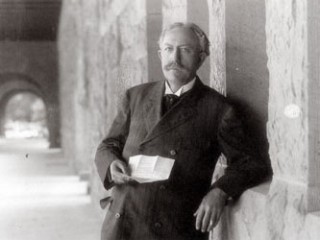
David Starr Jordan biography
Date of birth : 1851-01-19
Date of death : 1931-09-19
Birthplace : Gainesville, N.Y.
Nationality : American
Category : Science and Technology
Last modified : 2011-02-17
Credited as : Scientist, teacher of biology, eugenicist, ichthyologist
David Starr Jordan, American scientist and university administrator, distinguished himself as a teacher of biology, an ichthyologist, and an influential college president.
David Starr Jordan was born in Gainesville, N.Y., on Jan. 19, 1851. In 1869 he entered Cornell University and was awarded both his bachelor of arts and master of arts degrees 3 years later. He served as instructor in botany in Lombard University, Galesburg, Ill., in 1872-1873, and the following year he was principal of the Appleton Collegiate Institute in Wisconsin. After attending a school of science established by the famous scientist Louis Agassiz, Jordan became professor of natural history at Northwestern Christian College (later Butler University) in 1875. He received a medical degree in 1875 and 3 years later a doctorate in philosophy.
In 1879 Jordan became chairman of the department of natural sciences at Indiana University, where he distinguished himself as a teacher of organic evolution and bionomics. His research in ichthyology resulted in numerous publications, of which the most famous is Synopsis of Fishes of North America (1882).
Jordan became president of Indiana University in 1885 and during his 6 years in office instituted the concept of a major field of academic study for college students. In 1891 he became president of Stanford University and served in this position until 1913, when he became chancellor. Jordan's speeches and writings gained him a place among the great leaders in American higher education. His recognition of the need and importance of students' selecting their own subjects for study from the total range of the university program led to the introduction of the elective system at Stanford.
Many of Jordan's critical and scholarly assessments of higher education are contained in The Voice of the Scholar. This book consists of addresses delivered on such subjects as "The Personality of the University," "The University and the Common Man," "The Woman and the University," "The University of the United States," and "College Spirit."
Jordan held numerous important positions as an ichthyologist. He was assistant to the U.S. Fish Commission, head of the American commission to study the fur seals in the Bering Sea, and member of the International Commission for Fisheries. He was also chief director of the World Peace Congress and one of the original trustees of the Carnegie Foundation. He died Sept. 19, 1931, having served as chancellor emeritus of Stanford for 15 years.
















